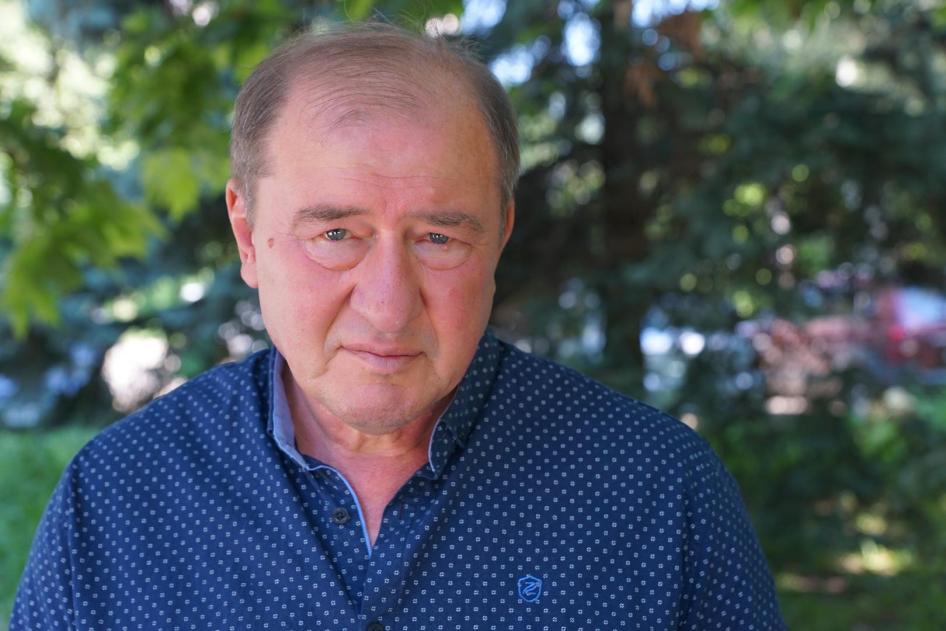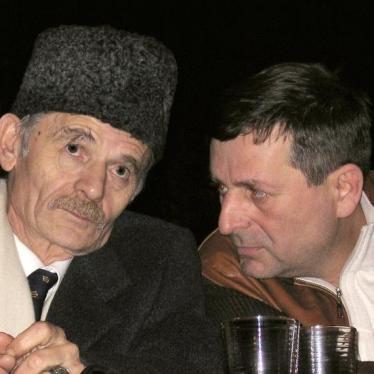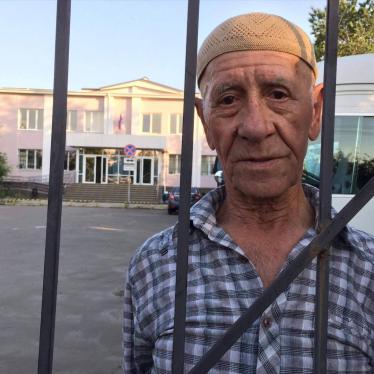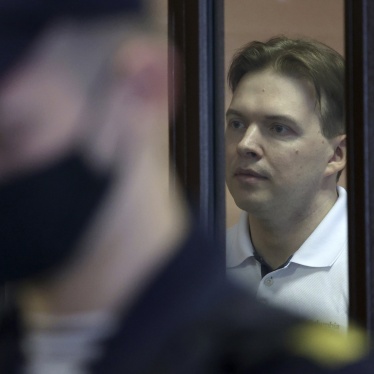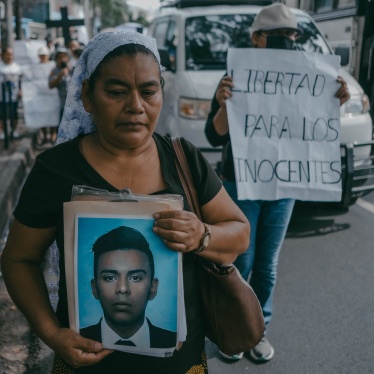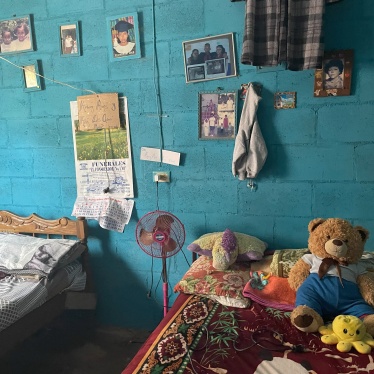(Kyiv) – A Russian court in Crimea on September 27, 2017, convicted a prominent Crimean Tatar leader on bogus separatism charges following an unfair trial, Human Rights Watch said today.
The court imposed a two-year prison sentence and banned Ilmi Umerov, the Crimean Tatar leader, from involvement in public activities, which includes contact with the media, for two years. The sentence is harsher than the three-year suspended sentence sought by the prosecution. Russian authorities should take the necessary steps to have Umerov’s two-year prison sentence set aside, and stop persecuting him and other Crimean Tatars for their peaceful opposition to Russia’s occupation of Crimea.
“Ilmi Umerov has been an outspoken critic of Russia’s occupation of his home,” said Tanya Cooper, Ukraine researcher at Human Rights Watch. “Russian authorities are sending him to prison for speaking his mind and saying the occupation should end.”
Umerov, 60, is a former head of the Bakhchisaray district administration in Crimea and a deputy chairman of Mejlis, the Crimean Tatars’ elected representative body. The Supreme Court of Crimea banned the Mejlis in April 2016 as an extremist organization.
Since Russian forces began taking over Crimea in February 2014, Umerov has been a vocal critic of the occupation and the Russian administration’s persecution of Crimean Tatars, an ethnic minority who openly oppose Russia’s occupation of Crimea, a part of Ukraine.
Russia’s Federal Security Services (FSB) briefly arrested Umerov in May 2016, charged him with separatism under part 2 of Article 280.1 of the Russian criminal code, and banned him from leaving Crimea during the investigation and trial. In April 2017, he told Human Rights Watch researchers that due to the travel ban, he was prevented from seeking the medical care required for his health conditions outside Crimea. Umerov has diabetes, Parkinson’s disease, and heart disease.
One of Umerov’s lawyers, Mark Feygin told Human Rights Watch that Russia’s FSB charged Umerov with separatism after he said in a live interview with the Crimean Tatar TV channel ATR in March 2016 that Crimea should be returned to Ukraine. FSB investigators contended that Umerov threatened Russia’s territorial integrity by saying, “It’s important to make Russia leave Crimea, Donbas, and Luhansk, if it were possible to restore Ukraine’s former borders.” Umerov told Human Rights Watch that a linguistic analysis of this interview conducted by an expert for the prosecution misinterpreted his words to bolster the separatism charges.
Feygin said that the investigation and trial in Umerov’s case were marred by procedural violations. In August 2016, FSB officers forcibly took Umerov from a Simferopol hospital, where he was receiving treatment for high blood pressure, to a psychiatric facility in the same city for an involuntary psychiatric evaluation, which lasted three weeks.
In January 2017, FSB officials in Crimea detained one of Umerov’s lawyers, Nikolai Polozov, as he was heading to a court hearing for Akhtem Chiygoz, another Crimean Tatar leader. Polozov told Human Rights Watch that the FSB held him for over two hours and questioned him about Umerov’s case. Polozov refused to answer officials’ questions, citing attorney-client privilege, but the FSB nonetheless said he had become a witness in the case, and a judge barred him from representing Umerov.
Feygin told Human Rights Watch that the judges began announcing the verdict before Feygin and Umerov’s two other lawyers arrived in the courtroom.
Umerov’s verdict follows guilty verdicts against two other vocal critics of Russia’s actions in Crimea. On September 11, another prominent Crimean Tatar leader and a Mejlis deputy chairman, Akhtem Chiygoz, was sentenced to eight years in prison on charges of organizing “mass riots.” On September 22, a Russian court in Simferopol convicted Radio Free Europe/Radio Liberty (RFE/RL) journalist Mykola Semena of separatism, and imposed a 30-month suspended sentence and a three-year ban on all public activities, including journalism. The court found Semena guilty because of articles in which he criticized Russia’s occupation of Crimea and of the repression and abuses that followed.
Under international law, the Russian Federation is an occupying power in Crimea as it exercises effective control without the consent of the government of Ukraine, and there has been no legally recognized transfer of sovereignty to Russia. A referendum, held without the authorization of the Ukrainian government or any broad-based endorsement by other countries, and Russia’s unilateral actions afterward, cannot be considered to meet the criteria under international law for a transfer of sovereignty that would end the state of belligerent occupation.
On September 25, the United Nations Human Rights Monitoring Mission in Ukraine released its first report on the human rights situation in Crimea, concluding that it “has significantly deteriorated under Russian occupation.”
“Russian authorities once again showed how far they are willing to go to silence those who publicly denounce their abuses in Crimea,” Cooper said. “The verdict against Ilmi Umerov is ruthless retaliation against him and a stark warning to others in Crimea.”
